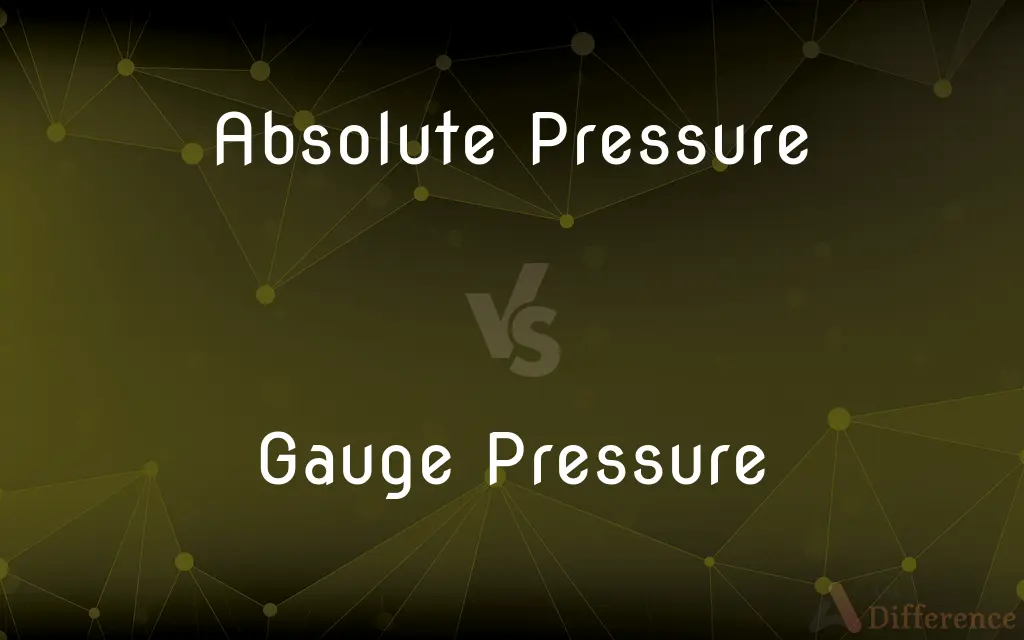Absolute Pressure vs. Gauge Pressure — What's the Difference?
By Tayyaba Rehman — Published on December 2, 2023
Absolute Pressure is total pressure, Gauge Pressure is relative to atmospheric pressure.

Difference Between Absolute Pressure and Gauge Pressure
Table of Contents
ADVERTISEMENT
Key Differences
Absolute Pressure is the total pressure exerted by a fluid (liquid or gas) which includes atmospheric pressure as well as any additional pressure added to the system. Gauge Pressure, on the other hand, measures the pressure relative to the local atmospheric pressure.
When we refer to Absolute Pressure, we're taking into account the entire pressure exerted, starting from a perfect vacuum (zero pressure). Gauge Pressure only considers the pressure above or below the ambient atmospheric pressure.
In practical applications, Gauge Pressure is commonly used because many systems operate relative to the surrounding environment. In contrast, Absolute Pressure is crucial in scientific and some specific industrial applications where total pressure is essential.
For example, in a car tire, the Gauge Pressure might read 32 psi, indicating it's 32 psi above atmospheric pressure. However, the Absolute Pressure inside the tire is the atmospheric pressure plus those 32 psi.
Absolute Pressure is never negative since it's measured from the absolute zero of pressure, while Gauge Pressure can be negative if it's below atmospheric pressure.
ADVERTISEMENT
Comparison Chart
Reference Point
From perfect vacuum (0 psi)
From local atmospheric pressure
Measurement Range
Can never be negative
Can be positive or negative
Common Use Cases
Scientific research, thermodynamics
Everyday applications like tire pressure
Dependency
Not influenced by changes in atmospheric pressure
Affected by changes in atmospheric pressure
Interpretation
Total pressure in the system
Pressure relative to atmosphere
Compare with Definitions
Absolute Pressure
Pressure measured from a perfect vacuum.
The Absolute Pressure inside a vacuum chamber is very close to zero.
Gauge Pressure
Pressure measurement above or below atmospheric pressure.
The Gauge Pressure in the car's tire is 30 psi above atmosphere.
Absolute Pressure
Measurement including both internal and atmospheric pressures.
To determine the Absolute Pressure, you must account for both the system's internal pressure and the surrounding atmospheric pressure.
Gauge Pressure
Measures only the excess or deficit pressure from atmosphere.
If a device shows a Gauge Pressure of 0 psi, it means the internal pressure is equal to the atmospheric pressure.
Absolute Pressure
Total pressure within a system, regardless of external conditions.
The Absolute Pressure inside a sealed container remains constant even if the altitude changes.
Gauge Pressure
Reading typically used for everyday applications.
Most tire pressure gauges show Gauge Pressure, not Absolute Pressure.
Absolute Pressure
The sum of atmospheric and gauge pressures.
In deep sea diving, Absolute Pressure increases significantly.
Gauge Pressure
Can be positive or negative based on its relation to atmospheric pressure.
A partial vacuum in a container might display a negative Gauge Pressure.
Absolute Pressure
The pressure relative to absolute zero pressure.
As we ascend in the atmosphere, Absolute Pressure decreases.
Gauge Pressure
Difference between absolute and atmospheric pressures.
If a system's Absolute Pressure is 45 psi and the atmospheric pressure is 14.7 psi, the Gauge Pressure is 30.3 psi.
Common Curiosities
What does Absolute Pressure reference?
Absolute Pressure references the total pressure from a perfect vacuum.
If the Gauge Pressure of a tire is 30 psi, what's the Absolute Pressure?
Absolute Pressure is the sum of Gauge Pressure and atmospheric pressure (typically 14.7 psi at sea level). So, it would be 44.7 psi.
How is Gauge Pressure different from Absolute Pressure?
Gauge Pressure measures pressure relative to local atmospheric pressure, while Absolute Pressure measures from a vacuum.
Can Absolute Pressure be negative?
No, Absolute Pressure is always non-negative as it starts from a perfect vacuum.
In what situation can Gauge Pressure be negative?
Gauge Pressure can be negative when the pressure inside a system is below the local atmospheric pressure.
Why do we need to know Absolute Pressure in scientific research?
Absolute Pressure gives a complete picture of total pressure, unaffected by local atmospheric conditions, crucial for precise scientific calculations.
Can both Absolute Pressure and Gauge Pressure be used interchangeably?
No, their reference points differ; it's essential to know which one is being referenced in context.
Why is my tire pressure gauge showing only Gauge Pressure?
Tire pressure gauges typically show Gauge Pressure as it indicates how much pressure is added to or subtracted from the atmospheric pressure.
Is Gauge Pressure useful in household applications?
Yes, many household tools like tire gauges and air compressors use Gauge Pressure to indicate pressure levels.
Why might a scientist need Absolute Pressure rather than Gauge Pressure?
Absolute Pressure is essential for equations and laws in thermodynamics and fluid dynamics where total pressure is crucial.
How is Gauge Pressure affected if atmospheric pressure changes?
Since Gauge Pressure is relative to atmospheric pressure, a change in atmospheric pressure will affect the Gauge Pressure reading.
How can one convert Gauge Pressure to Absolute Pressure?
Add the local atmospheric pressure to the Gauge Pressure to get Absolute Pressure.
Can the Absolute Pressure of a system be equal to atmospheric pressure?
Yes, if the system has no added or subtracted pressure from the atmosphere, its Absolute Pressure equals the atmospheric pressure.
How do altitude changes affect Absolute Pressure and Gauge Pressure?
Altitude changes will affect atmospheric pressure, which in turn will affect Gauge Pressure readings. Absolute Pressure, however, measures total pressure irrespective of altitude.
Does a Gauge Pressure of zero mean there's no pressure in a system?
No, a Gauge Pressure of zero means the system's pressure is equal to the local atmospheric pressure.
Share Your Discovery

Previous Comparison
Capital Expenditure vs. Revenue Expenditure
Next Comparison
Allylic Carbon vs. Vinylic CarbonAuthor Spotlight
Written by
Tayyaba RehmanTayyaba Rehman is a distinguished writer, currently serving as a primary contributor to askdifference.com. As a researcher in semantics and etymology, Tayyaba's passion for the complexity of languages and their distinctions has found a perfect home on the platform. Tayyaba delves into the intricacies of language, distinguishing between commonly confused words and phrases, thereby providing clarity for readers worldwide.














































